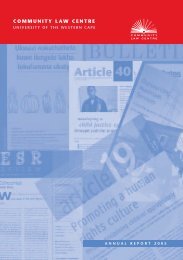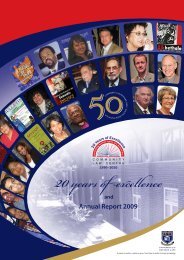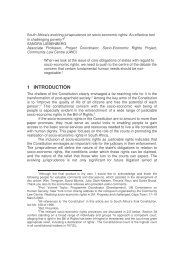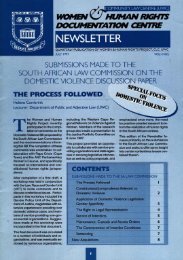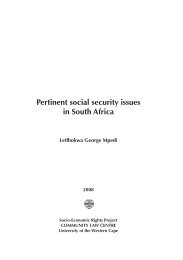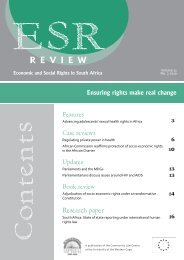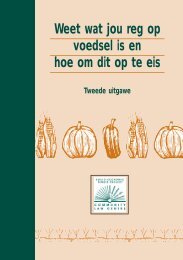ESR Review Volume 11 No 1 - January 2010 - Community Law Centre
ESR Review Volume 11 No 1 - January 2010 - Community Law Centre
ESR Review Volume 11 No 1 - January 2010 - Community Law Centre
Create successful ePaper yourself
Turn your PDF publications into a flip-book with our unique Google optimized e-Paper software.
13<br />
into the legislative jurisdiction to create or amend statutes,<br />
and must respect the separation of powers (para 39).<br />
Regarding the third question, and in response to an argument<br />
by the applicants and amici that the government<br />
could afford the financial burden resulting from equalising<br />
the old age pension, the Court held that it was the prerogative<br />
of government to determine its financial resources<br />
and the deployment thereof (para 40). Furthermore, the<br />
Court accepted the government’s contention that it could<br />
not afford the equalisation (para 40).<br />
The Court then dismissed the application with costs<br />
against the applicants and the amici (para 41).<br />
‘<br />
‘<br />
The decision is a very negative<br />
contribution to the jurisprudence<br />
on socio-economic rights in South<br />
Africa.<br />
‘<br />
‘<br />
Some concerns with the decision<br />
This is a troubling decision, because it seeks to uphold a<br />
dead legislative scheme. Moreover, the decision seeks to<br />
give effect to rights in the Constitution, yet ignores a legislative<br />
development that seeks to give effect to constitutional<br />
rights. The case was heard nearly three years ago.<br />
Since then, there has been a fundamental legislative development<br />
that effectively renders the key challenge moot.<br />
The government, after the hearing, decided to amend the<br />
contentious legislation so as to extend access to old age<br />
grants to the excluded class of persons on a progressive<br />
basis. This development essentially made the judge’s task<br />
so much easier. It is very likely that the amended legislation<br />
was not subsequently put before the Court by any of<br />
the parties, which thus explains the Court’s overlooking of<br />
it. However, a court should not ignore relevant legislation<br />
when giving effect to the Constitution. It is therefore unfortunate<br />
that the Court did not take it upon itself to consider<br />
the legislative development.<br />
An important aspect of the decision, and perhaps the<br />
most negative one, is the Court’s costs order against the<br />
applicants and the amici without hearing them on the issue<br />
and without the government seeking costs against the<br />
amici in its submissions. This was not entirely unexpected,<br />
given the court’s rather strong language: ‘The amici curiae,<br />
in essence, had ganged with the applicants against the respondents<br />
… and they should be regarded as having failed<br />
in their quest, thus attracting costs against them’ (para<br />
41). The decision ignores constitutional jurisprudence<br />
from several cases providing that as a general rule in constitutional<br />
matters, costs should not be issued against private<br />
litigants who raise constitutional claims against the<br />
state, or against an amicus curiae, regardless of the side it<br />
joins. (See, among other cases, Women’s Legal <strong>Centre</strong> Trust<br />
v President of the Republic of South Africa and Others 2009<br />
(6) SA 94 (CC) para 32; Biowatch Trust v Registrar, Genetic<br />
Resources and Others 2009 (6) SA 232 (CC) at paras 22–25;<br />
Mohunram and Another v National Director of Public Prosecutions<br />
and Another 2007 (4) SA 222 (CC) at para 105; Hoffman<br />
v South African Airways 2001 (1) SA 1 (CC) at para 63.);<br />
The government should therefore as a general rule bear its<br />
own costs when resisting a constitutional challenge.<br />
Quite correctly, the amici and applicants have submitted<br />
applications for leave to appeal against the court’s cost<br />
order.<br />
Conclusion<br />
Based on legislative developments after the hearing of the<br />
case that extended old age grants to the aggrieved class of<br />
persons progressively, the case has effectively been rendered<br />
inconsequential. The decision is a very negative contribution<br />
to the jurisprudence on socio-economic rights<br />
in South Africa and especially the jurisprudence on who<br />
bears costs in constitutional litigation. The Court appears<br />
to be raising a red flag to socio-economic rights adjudication<br />
in general, and public interest litigation in particular,<br />
by awarding a punitive costs order against the amici. The<br />
approach of the Court in relation to costs is unfortunate in<br />
a country where litigation is beyond the means of its poor<br />
majority and public interest litigation fills a crucial void and<br />
remains the poor’s best hope of a better life.<br />
Lilian Chenwi is the coordinator of, and senior<br />
researcher in, the Socio-Economic Rights<br />
Project. Siyambonga Heleba is a lecturer in the<br />
<strong>Law</strong> Faculty, University of Johannesburg.<br />
The full judgment is available at http://www.communitylawcentre.org.za/court-interventions/<br />
archive-of-courtinterventions/OAP_HC_judgment.pdf.<br />
Reference<br />
Heleba, S 2007. Towards equalising the age for accessing<br />
pensions. 8(4) <strong>ESR</strong> <strong>Review</strong>: 14.<br />
<strong>ESR</strong> <strong>Review</strong> Vol <strong>11</strong> <strong>No</strong>. 1 <strong>2010</strong>






